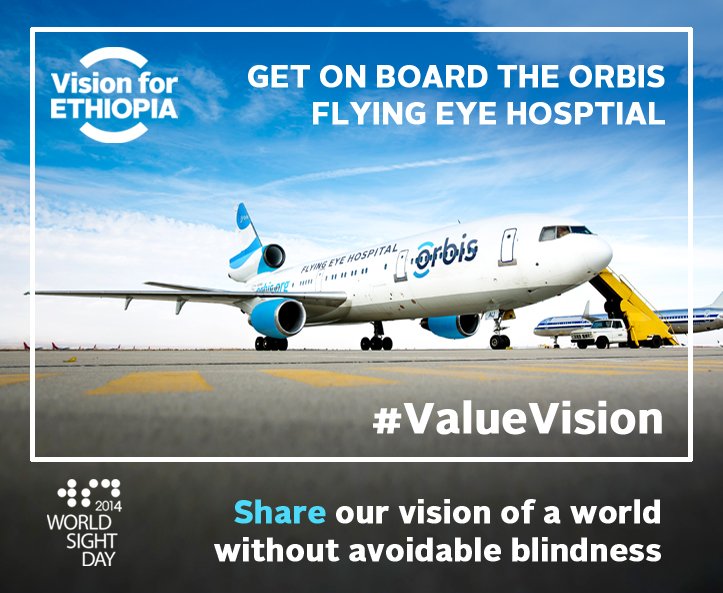For over 30 years Orbis, an international sight-saving charity, has been operating a Flying Eye Hospital to help eliminate avoidable blindness around the world. An innovative combination of medicine and aviation, it is an aircraft converted in a fully functioning eye hospital - initially a DC-8 and more recently a DC-10. Next year the charity will launch its new MD-10 next generation flying hospital.
The charity is currently running an appeal in line with World Sight Day 2014 to help eliminate avoidable blindness in Ethiopia, which has one of the highest rates of vision loss in the world. One of the conditions the appeal will raise money to tackle is trachoma which was wiped out in the UK 60 years ago, but is still the leading global cause of infectious blindness. Ethiopia has one of the highest known rates of the disease in the world.

Trachoma is painful and highly contagious and repeated exposure causes the eyelids to turn inwards, scraping the lashes across the eye with every painful blink. This can permanently damage the cornea resulting in blindness.
Women are three times as likely to be affected by the condition: mothers are more frequently exposed to it through their children, with two in five children in Ethiopia infected. However, it can be easily treated through antibiotics and improved sanitation.
Orbis’s Vision for Ethiopia appeal aims to raise £226,000 by the end of the year to fulfil its target of raising £1.5 million in 2014 for its work in Ethiopia tackling this disease, cataracts and other forms of avoidable blindness.

“Because of debilitating eye problems like blinding trachoma, many children in Ethiopia find it hard to attend school. Orbis identifies and trains people in local communities, including teachers, to look out for the signs of eye disease,” Allan Thompson, EMEA Director of External Relations for ORBIS told The HUB.
“With the UK public’s support we can continue to make a difference in this country and ensure that children receive an education by providing access to antibiotics, glasses and surgery. By supporting our appeal you are not only saving a child’s sight, you’re also giving them their future back,” he added.
Orbis has launched an appeal microsite which shares stories of how trachoma has impacted the lives of people in Ethiopia and how donations can help. You can view it here.
Routes have been supporting Orbis since 2005 and are proud to get behind the Vision for Ethiopia appeal. It doesn’t cost much to make a difference: as little as £5.35 will pay for eyelid surgery; £20 will provide antibiotics to treat the trachoma infection in 120 people, while £300 will train a nurse for a month, enabling her to deliver eye care to thousands of people in her local community.

Orbis has been teaching eye care teams in the developing world for over 32 years and has performed more than 23.3 million treatments whilst training over 325,000 medical professionals during this time. They do this through hospital based programmes and utilising their one of a kind Flying Eye Hospital teaching facility, which features an operating theatre, lecture theatre and pre and post-op spaces on board. This plane allows medical volunteers, who donate their annual leave, to train ophthalmologists, nurses and anaesthetists in areas of need, to help them help more people suffering in their community.
During the 18th World Route Development Forum in Abu Dhabi, United Arab Emirates (UAE) in late September and early October 2012, the Orbis Flying Eye Hospital Douglas DC-10 was stationed at Al Bateen Executive Airport. Delegates were invited to tour the aircraft and see the facilities onboard this modified freighter aircraft, including the operating room where volunteer surgeons and local doctors perform surgery to help eliminate avoidable blindness around the world.





